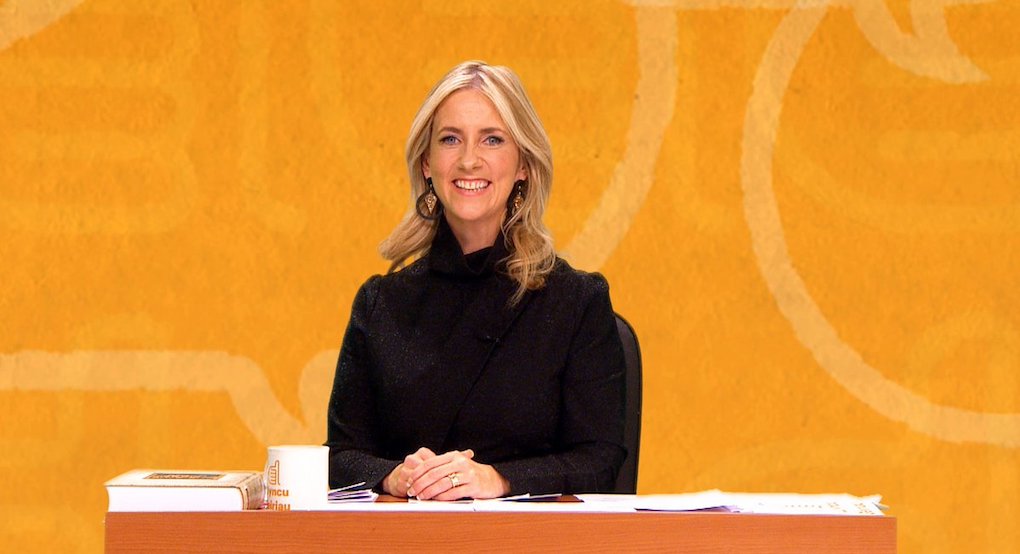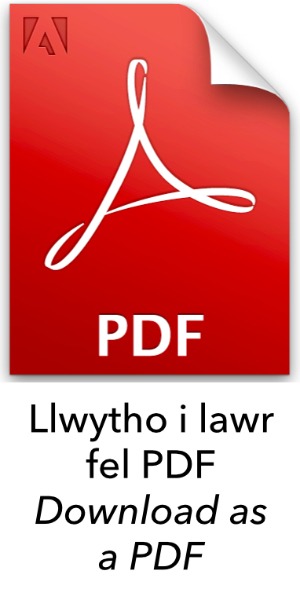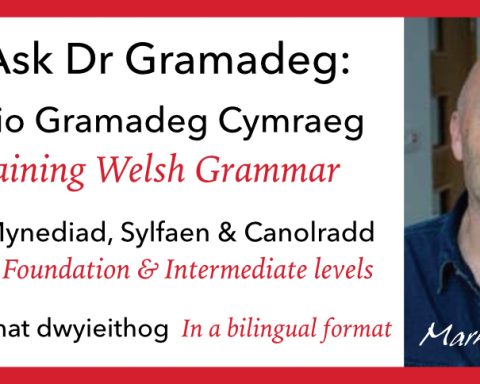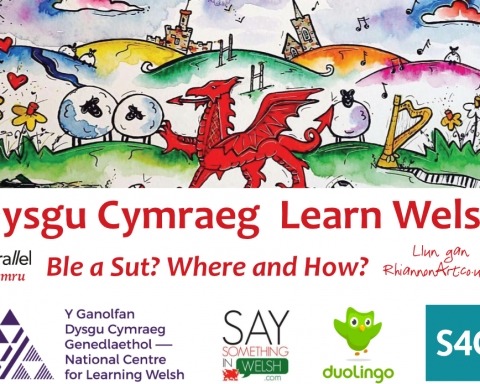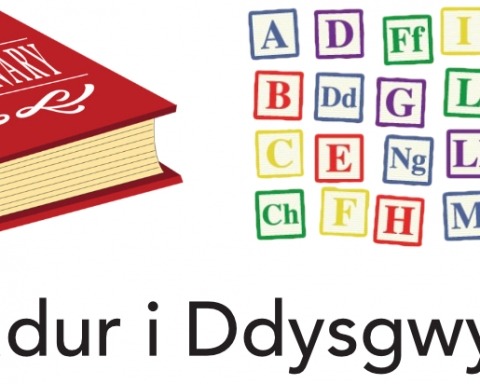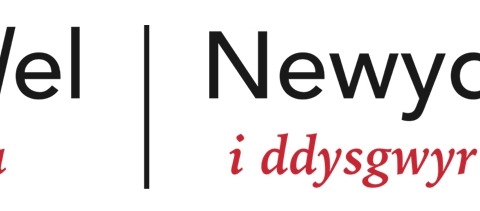Mae Eleri Siôn yw’r un o’r y personoliaethau mwyaf adnabyddus ar S4C, ac nawr mae’n hi’n cyflwyno cyfres newydd o’r sioe cwis geiriol am ddysgwyr- Llyncu Geiriau. Eisteddais i lawr â hi i ofn am y sioe ac am gyflwyno…
Eleri Siôn is one of the most recognisable personalities on S4C, and now she is presenting a new series of the verbal game show for learners- Swallowing Words. I sat down with her to ask about the show and about presenting…
| Eleri, dych chi'n cyflwyno'r segment Llyncu Geiriau ar gyfer y rhaglen S4C Dal Ati. Pa fath o sioe yw Llyncu Geiriau a dylwn pwy gwylio hi? Cwis geiriol yw’r Llyncu Geiriau, lle mae’r cystadleuwyr yn cael cyfle i greu, cofio a chyfieithu geiriau o bob math. Y math o bobl sydd yn cystadlu yw’r bobl sydd wedi dysgu Cymraeg, ond sy’n da iawn yn y Gymraeg. Achos mae e gwis llawn sbort, ond mae’n gallu bod yn eithaf anodd ar brydiau. Wedi dweud hynny achos yr isdeitlau yn gyfle am bawb i ddilyn hi. | Eleri, you’re presenting the Swallowing Words segment on the S4C programme Dal Ati. What sort of show is Llyncu Geiriau and who should watch it? Llyncu Geiriau is a verbal quiz, where the competitors have opportunities to create, remember and translate words of all kinds. The sort of people who compete are those who have been learnt Welsh, but are very good in Welsh. It is a quiz full of fun, but it can be quite challenging at times. I’ve said that because subtitles give an opportunity for everyone to follow it. |
| Sut gwnaethoch chi ddechrau yn showbiz, ac oes unrhyw uchafbwyntiau gyda chi? Gwnes i ddechrau yn showbiz pan ro’n i’n 16 oed. Ro’n i’n canu ar raglennu gwahanol ar S4C. Wedyn gwnes i newid o’r byd canu i’r byd chwaraeon pan es i’r Brifysgol yng Nghaerdydd. Gwnes i ddechrau cyflwyno rhaglen chwaraeon i blant o’r enw Cracabant a sut dechreuodd y siwrnai yn y byd cyflwyno. Uchafbwyntiau- dw i’n credu roedd fy uchafbwynt gweithio i BBC Wales ym Mhencampwriaeth Euros 2016. | How did you start in showbiz, and what are your highlights? I started in showbiz when I was 16. I was singing on variety programmes on S4C. Then I changed from the world of singing to the world of sports when I was in university in Cardiff. I started presenting sports programmes for children, called Cracabant, and that started the journey into the world of presenting. Highlights- I believe that the highlight was working for BBC Wales in the Euros Championship 2016 (football). |
| Waw- profiad unigryw! Gwnes i gael y cyfle i fod yn y Ffrainc am yr holl gemau Cymru, felly wrth gwrs roedd e uchafbwynt hyd yn hyn. Er, yn 2003, ces i’r cyfle i weithio am Gwpan y Byd yn Awstralia a ces i wyth wythnos mas yn Awstralia. A dyna’r pan ddechrau newid tîm rygbi Cymru, cyn gwnaethon nhw ddechrau ar yr eu taith lwyddiannus. | Wow- a unique experience! I had the opportunity to be in France for all the Wales games, so of course that has been the highlight so far. Although, in 2003 I had the opportunity to work for at the World Cup in Australia and I had eight weeks out in Australia. And that started the changes for the Welsh rugby team, before they started on their successful journey. |
| A ha, felly caethoch chi rhywbeth i wneud gyda’r newid wedyn? Ydy, dw i’n credu gwnes i chwarae rhan o hyn i gyd! | A ha, so you had something to do with the change then? Yes, I believe that I played a part in it all! |
| Dych chi'n cyflwyno rhaglenni i BBC Radio Wales hefyd. A oes gwahaniaeth rhwng cyflwyno yn y Gymraeg a Saesneg? Oes. Ar y dechrau roedd e lot o wahaniaethau. Gwnes i ffeindio fy hunan cyrraedd cul-de-sac ieithyddol, lle ro’n i’n dechrau siarad yn Saesneg a ro’n i’n meddwl o’r frawddeg, a chyflwyno, ac wedyn gwnes i methu cofio’r gair yn Saesneg am rywbeth. Bellach, mae’n digwydd i fi yn y Gymraeg hefyd! | You present programmes for BBC Radio Wales as well. Is there is a difference between presenting in Welsh and in English? Yes. At the start there was lots of differences. I found myself arrive in linguistic cul-de-sacs, where I would start speaking in English and think of the sentence, continue presenting, and then I couldn’t remember the English word for something. Now, it happens to me in Welsh as well! |
| A finnau hefyd- trwy’r dydd! Ie, dw i’n credu bod i gyd Cymry iaith Cymraeg neu Gymry ail iaith Gymraeg. | And me as well- all the time! Yes, I believe it happens to all Welsh first and second language speakers. |
| Dylwn e fod lot o hwyl i siarad â dysgwyr a gweld faint maen nhw wedi dysgu am yr iaith. Oes unrhyw gyngor gyda chi i bobl sydd ar y daith i fod yn rhugl? Ymarfer, ymarfer ac ymarfer, cymaint â phosib. Peidiwch â theimlo embaras. Dyn ni’n siarad iaith naturiol yng Ngheredigion er enghraifft, lle dyn ni’n taflu ambell iaith Saesneg i mewn er mwyn ni’n gallu cynnal sgwrs. Peidiwch â ofni bod yn ofnus os dyn ni’n ddim yn gwybod pob gair Cymraeg. Dw i’n ddim yn treiglo pob tro achos mod i’n ddim yn cofio. Paid â thrio siarad Cymraeg perffaith achos os dyn ni’n trio siarad yn naturiol- paid â phoeni am eiriau Cymraeg a’r gramadeg- jest trio cynnal sgwrs naturiol. | It must be lots of fun to speak with learners and see how they learned the langauge. Do you have any advice for people on the journey to fluency? Practice, practice and practice, as much as possible. Don’t feel embarrassed. We speak naturual Welsh in Cardigan for example, where we throw Welsh words in while holding a conversation. Don’t be a afraid if we don’t know every word of Welsh. I don’t mutate every time because I don’t remember. Don’t try to speak perfect Welsh because we try to speak naturally- don’t worry about Welsh words and grammar- just try to hold a natural conversation. |
| Ac i gwpla, oes unrhyw hoff eiriau Cymraeg gyda chi? Dw i'n hoffi geiriau compound fel llosgfynedd a bolgi... Dw i’n hoffi clatscho a ffeighto, achos maen nhw’n geiriau onomatopoeiac- maen nhw’n swnio fel maen yn. Dw i’n lico’r gair ffrwchledd am banana. Dw i’n hoffi cwtch hefyd. A hefyd dw i’n hoffi danjerus- dw e ddim yn air yn y geiriadur, ond i’n defnyddio fe fel gair yn y Gymraeg. | And to finish, do you have any favourite words? I like compound Welsh words such as volcano and glutton... I like clatsho and ffeighto, because they sound like onomatopoeiac words- they sound like the are. I like the word ffrwchledd for banana. I like cwtch as well. And I also like danjerus- it’s not a word in the dictionary, but I do use it like a Welsh word. |
Mae Dal Ati ar gael am 30 diwrnod ar ôl y darllediad arlein ar S4C’s Clic: www.s4c.cymru/clic/c_index.shtml ac mae mwy o wybodaeth ar y raglen yma: s4c.cymru/cy/adloniant/dal-ati/.
Dal Ati is available for 30 days after broadcast online on S4C’s Clic: s4c.cymru/clic/e_index.shtml and there is more information on the programme here: s4c.cymru/en/entertainment/dal-ati.
Hefyd, mae Eleri yn cyflwyno sioe dyddiol ar Radio Wales sy’n ar gael ar alw: bbc.co.uk/programmes/b03d51wc.
Eleri also presents a daily show on Radio Wales that is available on demand: bbc.co.uk/programmes/b03d51wc.

